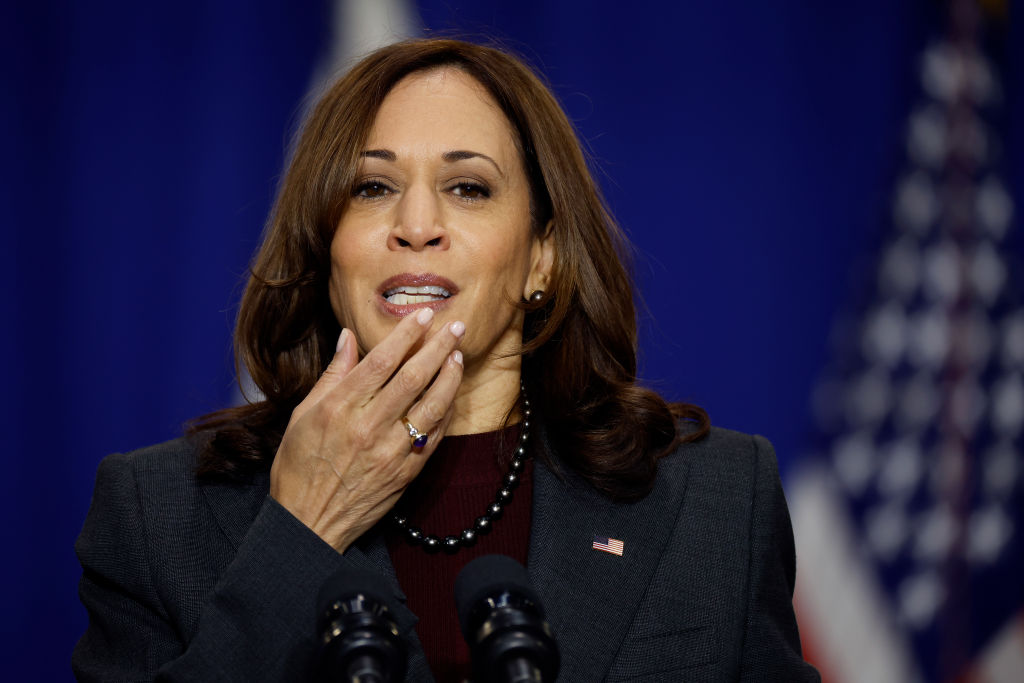Vice President Kamala Harris has tested positive for COVID-19. This, on its face, should be no big deal. However, the White House managed to throw up a red flag when it announced her course of treatment — particularly given the line of succession to the nation’s highest office.
According to an announcement from Harris’ press secretary on Tuesday, the veep had been prescribed an anti-viral drug that is only indicated for those in high-risk categories. The announcement raised questions about how serious Harris’ case of COVID is and what effect — if any — it will have at the White House.
(As information becomes available, The Western Journal will continue to update readers with news and analysis about Harris’ COVID diagnosis — as well as other developments out of Washington at this crucial time. If you support our conservative, Christian journalism, please consider subscribing.)
As the Los Angeles Times noted, this should be no big deal, since Harris isn’t supposed to be in a high-risk group.
“Harris, 57, has been vaccinated and boosted twice. The shots greatly diminish the chances of her becoming seriously ill. When former President Trump, 75, was hospitalized with COVID-19 in October 2020, he was at much higher risk, given his age and the lack of available vaccines,” the report noted.
And, all seemed to be well otherwise, considering officials said Harris was experiencing no symptoms. Harris’ press secretary, Kirsten Allen, said the vice president “will isolate and continue to work from the Vice President’s residence” while she’s ill.
“The Vice President will return to the White House when she tests negative,” Allen said.
However, Allen also tweeted this on Tuesday:
Today, after consultation with her physicians, the Vice President was prescribed and has taken Paxlovid.
— Kirsten Allen (@KirstenAllen46) April 26, 2022
“Today, after consultation with her physicians, the Vice President was prescribed and has taken Paxlovid,” Allen said.
Paxlovid is the brand name of a Pfizer-manufactured antiviral drug made up of “nirmatrelvir tablets and ritonavir tablets, co-packaged for oral use,” according to the Food and Drug Administration’s website.
It was given emergency use authorization in December — but here’s where it gets problematic.
That emergency use authorization was specifically indicated for those “with positive results of direct SARS-CoV-2 testing, and who are at high risk for progression to severe COVID-19, including hospitalization or death,” the FDA website states.
Johns Hopkins University professor Dr. Marty Makary, a frequent critic of the Biden administration’s handling of the coronavirus, noted that this seemed unusual:
Surprised to learn that Kamala Harris who is asymptomatic, healthy, and quadruple vaccinated is getting Paxlovid, a drug reserved for high-risk patients per the FDA label.
— Marty Makary MD, MPH (@MartyMakary) April 27, 2022
“Surprised to learn that Kamala Harris who is asymptomatic, healthy, and quadruple vaccinated is getting Paxlovid, a drug reserved for high-risk patients per the FDA label,” he tweeted.
The reasons behind the prescription might be more political than medical. As ABC News’ Arielle Mitropoulos noted, the announcement Harris was being prescribed Paxlovid “comes as the administration announces new actions to increase access to the drug.”
The Vice President’s press secretary confirms that Harris is taking Paxlovid.
Her prescription for Paxlovid comes as the administration announces new actions to increase access to the drug. https://t.co/HJ2HDcAL0x
— Arielle Mitropoulos (@AMitrops) April 27, 2022
“The vice president’s diagnosis and treatment plan occurred on the same day as the administration announced that tens of thousands of pharmacies would be able this week to order Paxlovid, and that the government was launching new ‘test-to-treat’ locations where Americans could take a test and, if positive, be immediately prescribed and given the antiviral treatment,” Bloomberg reported.
That said, the prescription still raises questions the White House likely doesn’t want raised.
As the Los Angeles Times noted, “White House officials, who have signaled that they expect Biden will catch the virus, did not respond to questions about whether the president would take additional precautions in light of the vice president’s positive test.”
The Times also said Harris‘ COVID diagnosis “could create governing concerns given that Harris is the first in line of presidential succession to Biden, 79.”
A 79-year-old is definitely high-risk when it comes to COVID, which is particularly deadly for the elderly. Next in line after Harris and Biden, of course, would be House Speaker Nancy Pelosi, an 82-year-old who tested positive earlier in the month.
After that comes the president pro tempore of the Senate, who at the moment is Sen. Patrick Leahy of Vermont, the 80-year-old progressive who presided over the second impeachment trial of Donald Trump and has had his own health headlines.
After that comes Secretary of State Antony Blinken, then the rest of the cabinet secretaries in the order their departments were created.
So, while an individual’s age and health is always a delicate matter, it’s safe to say that for the United States at the moment, the bench of those who could theoretically succeed to the presidency and were actually elected to office isn’t particularly healthy. (Not to mention undesirable to those with a conservative mindset.)
As with the vast majority of people who test positive for COVID, the likelihood is that Harris will be back in action shortly, although it still raises questions about what would happen if both the president and vice president had COVID at the same time.
That said, the decision to prescribe her Paxlovid brings up one of two possibilities.
The first is that Harris’ case isn’t asymptomatic or that she has undisclosed risk factors. The second is that the vice president is being used to promote the administration’s intention to expand the use of Paxlovid beyond what the FDA’s emergency use authorization allows.
Either way, it’s a very bad sign, either for Harris herself, or the administration’s willingness to politicize medical decisions.
This article appeared originally on The Western Journal.

























 Continue with Google
Continue with Google